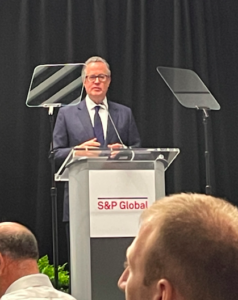The Climate Group hosted its 15th Annual Climate Week NYC last week amid growing skepticism in the U.S. around ESG and the green transition’s disruptive consequences.
To learn more, White Marble attended Advancing the Transition, a full day of sessions and panels held in the heart of Hell’s Kitchen, Manhattan. For this event, S&P Global Sustainable1 brought together experts from corporations, banking, investment management, and government to engage in discussions around framing the “transition” and address some of the concerns and projections for this transition.
 We noted four key takeaways from the event for asset managers, and their marketers in particular:
We noted four key takeaways from the event for asset managers, and their marketers in particular:
- There are still a lot of grey areas
- Don’t get distracted by political theater
- We don’t succeed until we all succeed
- A lack of ESG data continues to hold firms back
There are still a lot of grey areas
This is not just a U.S. issue. A lot of the confusion around framing the green transition is global. While larger standing rules like the Paris Agreement or the Kyoto Protocol exist, it’s not always explicitly clear how investors fit into the mix.
In the U.S., the Security Exchanges Commission (SEC) recently released its “Names Rule,” which aims to prevent misleading fund names or green-washing. Rules like these provide helpful direction, but firms are not alone in feeling confused or unsure of where to focus.
Don’t get distracted by political theater
Today, firms cannot talk about ESG without it being debated or questioned by large portions of Americans. Marco Alvera, co-founder and CEO of Tree Energy Solutions, said, “Many Americans are experiencing ‘Climate Fatigue’, which essentially boils down to a feeling of powerlessness and a lack of control [that make] our actions toward solving climate change futile.”
While this may seem bleak, David Atkin, CEO of Principles for Responsible Investment, followed this comment with optimism. Atkin believes that “we have a few years of pain to come but eventually we will get it right because we have to.” Not everyone at the event shared this more optimistic sentiment, though.
Regardless, firms seeking to succeed amid the current ESG debate should keep their focus on efforts and conversations that most effectively align with their long-term goals and try not to get distracted.

We don’t succeed until we all succeed
Participants expressed concern around how investors and governments can support and include developing countries in the green transition. Sagarika Chatterjee, Finance Lead for the UN’s Climate Change High-Level Champions, was the first to highlight the importance of climate financing for developing countries. While these areas are not the key contributors to climate change, they are the most negatively impacted by its continued progression. Thus, investors can face high levels of risk when investing in these areas.
Panelists emphasized the need for policies and protections to mitigate investors’ risks in these regions, and the need for more pressure on governments and the UN to develop these protections. David Atkin stated that overall, many investors want to invest in greener projects, but the lack of regulation and protection for risky investments, as well as the general scarcity of projects, is making it difficult to be involved. To combat these trends, we need to understand that there are lots of opportunities here – it’s just how to best capture them. This may require changes to the way we define value on the balance sheet.

A lack of ESG data continues to hold firms back
Data is key when it comes to making responsible investment decisions and the data needs to be credible. There is an influx of data in today’s market but a lack of trust in if that data is the “right” data.
Karen Bodner, the Head of Global Investor Relations Advisory at BNY Mellon, shared a statistic from her team’s research: 90% of investors said they found ESG somewhat important, but they felt that a lack of data around ESG would hinder them from making wise decisions with their investments. The survey participants wanted more research around:
- Output data
- Issues needed addressed according to specialists
- Expert insight
- Quantitative data
- ESG reporting data
Companies in the industry can provide this service, but investors don’t know where to begin or who they can

count on to provide them with the best support.
It was exciting to hear from experts who are not only passionate about progressing the transition, but who also offered real insight and addressed the issues head on. More progress needs to be made toward developing policies and protections for investors but hearing that more firms are looking at what they can do or should do to contribute to developing countries was encouraging. And while reporting for ESG data continues to improve, firms can find more ways to educate themselves to become responsible investors.
If we don’t ask the right questions and continue to educate ourselves on the ever-changing landscape, we will never contribute to the transition and will be left behind.
Interested in becoming a responsible investor? You can sign up for our course:
Responsible Investing Marketing Certificate | White Marble Consulting
Our hosts:
The Nest Climate Campus, the Official Event Partner of Climate Week NYC
Climate Group (theclimategroup.org)